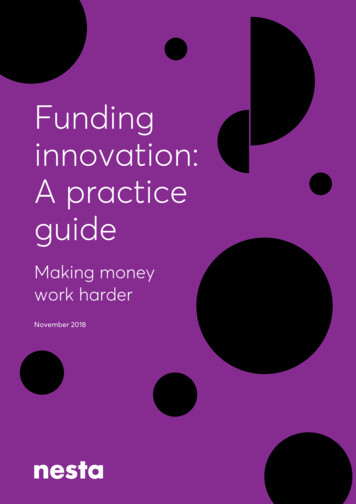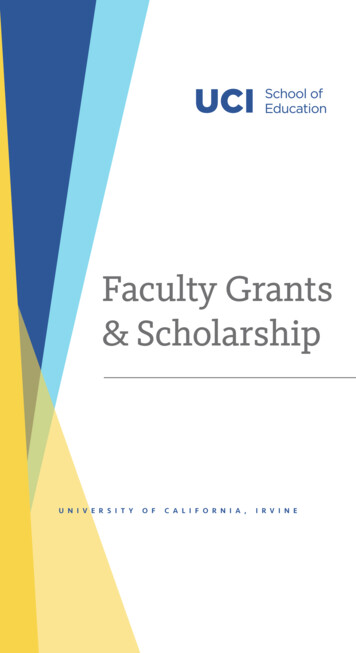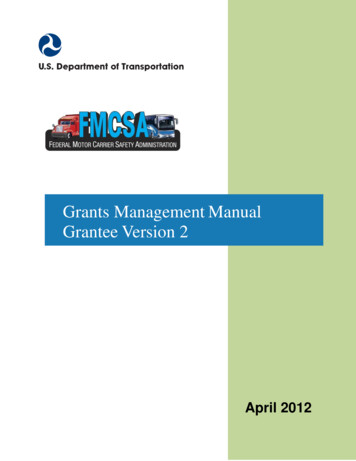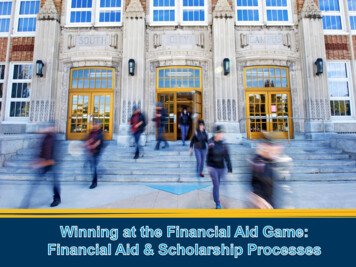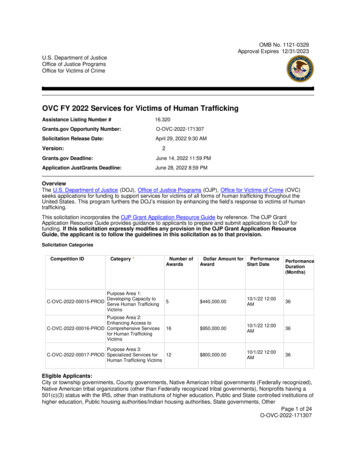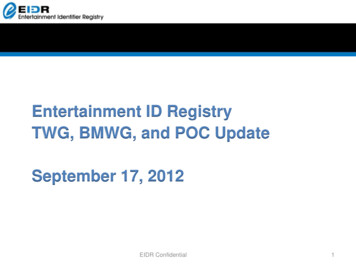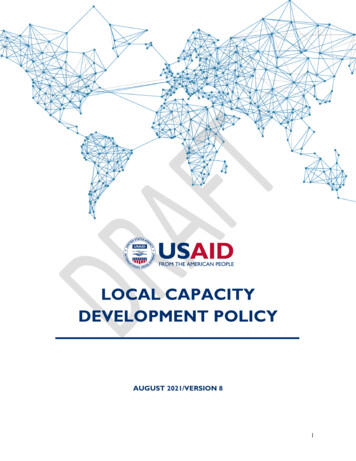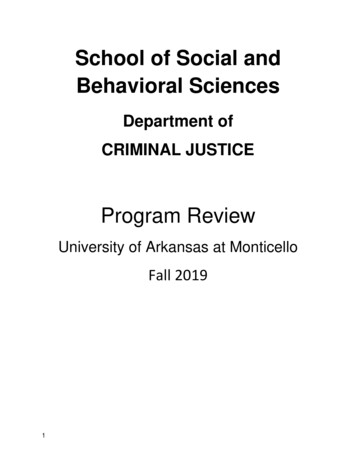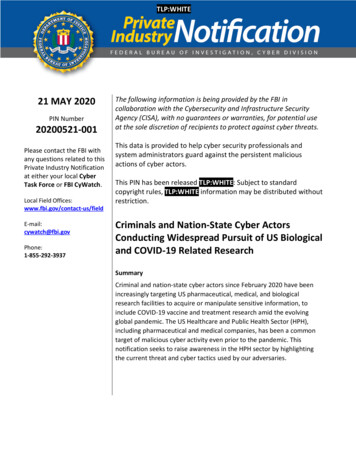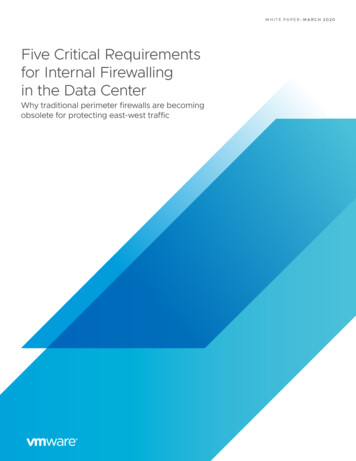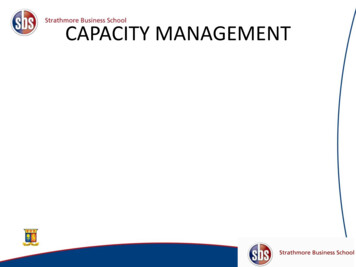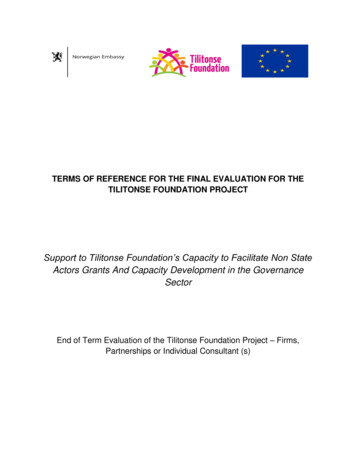
Transcription
TERMS OF REFERENCE FOR THE FINAL EVALUATION FOR THETILITONSE FOUNDATION PROJECTSupport to Tilitonse Foundation’s Capacity to Facilitate Non StateActors Grants And Capacity Development in the GovernanceSectorEnd of Term Evaluation of the Tilitonse Foundation Project – Firms,Partnerships or Individual Consultant (s)
1.0 Background of the ProgrammeTilitonse Foundation (TF) was established in 2016 as a local organization to support MalawianNon State Actors to engage in governance interventions. The Foundation’s work is within theMalawi Government development policy frameworks such as the Malawi Growth andDevelopment Strategy III, the Malawi Vision 2063, and global frameworks such as the SustainableDevelopment Goals (SDGs), the African Union Agenda 2063, and the Paris Declaration. TilitonseFoundation, guided by its 2018 – 2022 strategic plan, supports Non State Actors in consolidatingand up-scaling good governance in Malawi while aiming at increasing the capacity of NSAs toactively promote citizens’ engagement in democratic governance and in upholding citizens’ rightsby the state.Tilitonse Foundation believes that increased capacity of Non State Actors and promoting levelsof citizens’ engagement in democratic governance are important to catalyze increasedaccountability, responsiveness, and inclusivity of the state and other service providers. Theapproach that Tilitonse Foundation is advocating is one of collaboration, partnerships, coalitionbuilding, and having strong linkages to grassroots communities.In January 2018, the Tilitonse Foundation developed its Strategic Plan (2018 – 2022) with thefollowing Strategic Objectives: Promote accountable, responsive, and inclusive governance;Strengthen the organizational capacity of grant partners and the Foundation; as well as establishand strengthen partnerships and networksTilitonse Foundation interventions in the 2018 – 2022 period is guided by the following resultareas: Active citizenship: Duties of citizens; Voice and Action; Accountability and transparency;Democratic freedom to participate; Empowerment to participate Local governance: Roles of the Council and Committee; Roles of Secretariat; Councillorsand Members of Parliament; Traditional Leaders; people cantered development planning Gender and social inclusion: Gender Equality; Gender-based violence; Marginalizedgroups Economic governance: Access to economic opportunities; Equity of access to capital;Equity of distribution of resources; Pro-poor planning/budgeting; Access to economicskills; Extractive industry; Agriculture/marketing and pricing Rule of law: Access to justice; Juvenile justice; Knowledge of and appeal to law; Minorityrights; Respect for the law; Anti-Corruption.2.0 Scope of WorkBetween the period 2018 – 2022, the Tilitonse Foundation undertook activities with support fromthe EU Delegation in Malawi and the Royal Norwegian Embassy with a total budget of Euro 4.74million for a 4-year period. The activities were undertaken under a grant contract that focused onprogrammatic interventions, organizational development support and partnership and networking.In the stated period, the Foundation provided financial support to 41 grant partners comprising 11grant partners under the Open Call Window, 10 grant partners under the Thematic Call Windowand 20 grant partners under the Community-Based Organizations (CBO) call window. In total 41
projects were funded and implemented in over 21 districts in Malawi focusing on governance ingeneral, and in the following thematic areas: urban governance and management; SexualReproductive Health Rights (SRHR); Drug Pilferage; Affordable Input Program (AIP); NationalEconomic Empowerment Fund (NEEF); juvenile justice; public procurement; public resourcetracking and extractive industry. These projects also provided capacity development support.The spread of the projects supported is as follows: CBO Call: 20 projects were supported in 15 districts programming around Drug Pilferage(8), Sexual and Reproductive Health Rights (6), Affordable Input Program (2), NationalEconomic Empowerment Fund (2), and Urban Governance and Management (2). Thematic Call I: 5 projects were supported in 4 cities of Blantyre, Lilongwe, Mzuzu, andZomba covering urban governance and management. Thematic Call II: 5 projects in 5 cities of Blantyre, Lilongwe, Zomba, Mzuzu, andmunicipality of Mangochi covering urban governance and management (wastemanagement, revenue generation and utilization, urban structures, residents engagementin urban structures etc). Open Call I: 11 projects in 11 districts covering varied governance issues (local councils,drug pilferage, sexual reproductive health rights, public procurement, juvenile justice,extractive industry)The general conceptualization of the projects was to make them contribute to five result areasnamely active citizenship, rule of law, economic governance, local governance, and gender andsocial inclusion.2.1Purpose and ObjectivesThe main purpose of the final evaluation is to assess and consolidate the overall performance ofthe projects for the action, achievements and results, their contribution to the overall TilitonseFoundation expected outcomes and results, and their contribution towards national developmentgoals.The evaluation shall also assess the extent to which the funded projects have contributed to theachievement of the Tilitonse desired long-term and short term results with reference to specificindicators in the Tilitonse Foundation Log frame. The specific objectives of the evaluation are asfollows:1. To assess the relevance, effectiveness, and efficiency of the interventions based on theimplementing structure, systems, timeframe, and budget allocation;2. To establish the relevance of the Theory of Change, Political Economy Analysis in relation tothe project results.3. To assess performance and results based on the design, defined achievement of theobjectives (at outcomes and outputs levels), and to identify the supporting factors andconstraints that have led to this achievement and/or lack of achievement;
4. To identify evidence of potential or emerging impact and results, and sustainability of theinterventions on target groups, final beneficiaries, project partners, other stakeholders, andthe institution;5. To analyze best practices and strengths for potential scaling-up and replication of similarprogrammatic and organizational development interventions;6. To document lessons learned, draw out policy implications and insights of the projects as wellas the target groups, final beneficiaries, and grant partners;7. To come up with conclusions and recommendations that can be made for project design,programming and organizational development support, grant making and management,capacity development support, knowledge management and communication for projectsupport in the future.3.0 Evaluation Approach and MethodologyThe consultant should propose study designs that maximize collection of both quantitative andqualitative data that should focus on various levels (community, district, and national), targetvarious players that are relevant to the project (government, DPs, CSOs, district and city councils,citizens), and sample the project geographical areas.The proposed design clearly indicate how lessons and best practices would be generated as wellas providing a clear approach on triangulation of evidence.The proposed design to consider approaches that would enhance the achievement of theobjectives of this assignment even when baseline values are not available. The methodologyshould also provide the analysis framework to used. We also need to direct them4.0 DeliverablesThe deliverables under this assignment are listed in the table below.DeliverableDescriptionInception reportReport should describe the following:1. Understanding of the project based on project documents and literature review2. Finalized methodology including detailed sampling plan and field procedures3. Quality control measures4. Communication protocol throughout the evaluation5. Finalized timelines (activities, responsible parties, outputs, and timing)6. Draft Data collection tools and planDraft evaluation The report should be submitted in English addressing all the evaluation objectivesreportand key research questions.Come up with a PowerPoint presentation to be presented to Tilitonse Foundationstaff. The slides should include an abbreviated list of evaluation findings that canbe presented to relevant internal and external stakeholders.
The final version An electronic copy of the final evaluation report should be submitted in English inofthefinal both Microsoft- Word and PDF versions.evaluation reportThe report should include the following sections:i.Acknowledgementsii.List of Acronyms and abbreviationsiii.Table of Contentsiv.Executive Summary (no longer than two pages)v.Background (Program description and purpose of baseline)vi.Methodology and Implementationvii.Results and Findingsviii.Recommendationsix.AnnexesDisseminate the final report in a workshop where internal and externalstakeholders will attend.FinalData Electronic copies of all clean and final English-version of data collection toolsCollection ToolsFinalCleaned Clean and final English versions of:Dataa) quantitative data sets in Microsoft-Excel and any other utilized format (SPSS,STATA, R, etc)b) Qualitative transcripts, field and interview notes, complete list of key informantinterviews and FGDs in Microsoft-Word document5.0 Duration of the AssignmentThe assignment will be conducted within a 30 days’ period spread between June and July 2022,starting from the date of signing the contract.6.0 Consultants’ QualificationsThe assignment is to be carried out by a reputable consultant (s) who must possess a mix ofappropriate qualifications and expertise. The consultant must have a minimum of a Masters’Degree in Development Studies, Political Science, Demography, Social Science, or any otherrelevant field with a minimum of seven years’ proven experience in carrying out studies of a similarnature. The consultant(s) should demonstrate experience and/or include one with familiarity ingovernance programming. The consultant (s) should also have the following added attributes: A minimum of seven years’ expertise in designing and conducting quantitative andqualitative socio-economic surveys and evaluations; At least five years’ experience with rural and urban governance development projects andstudies; Understanding of institutional development interventions and experience in undertakingreview of organizational development interventions. Proven expertise and understanding of work in the following areas: rule of law, activecitizenship, economic governance, local government gender and social inclusion,networking and partnership;
Understanding of and experience of results-based management, and undertakingevaluation guided by Results Frameworks and logframe.Previous experience in evaluation of donor funded projectsExperience in evaluation of EU funded programs will be an added advantage;Knowledge of governance issues in Malawi will be an added advantageProven ability to produce high-quality reports and ability to meet deadlines;Excellent analytical, communication, and report writing skills.7.0 Selection CriteriaThe evaluation of proposals and selection of the consultant shall be conducted using QualityBased Selection (QCBS) in accordance with Tilitonse Foundation’s Procurement Guidelines.The selection criteria for technical proposal shall be as follows:Ref. NoEvaluation CriteriaMaximumScore1Qualifications and Experience of Key Staff152Understanding of the assignment, Adequacy of Proposed 50work plan, methodology, and Approach3Consultant’s firm’s Specific Experience in similar assignment 154Cost competitiveness and value20Total100Minimum passing score is 702.0 Submission:The interested firms must submit both Technical and Financial proposals enclosed in oneenvelope but in two separate envelopes marked “Proposal for Conducting Final Evaluation for theSupport to Tilitonse Foundation’s Capacity to Facilitate Non State Actors Grants and CapacityDevelopment in the Governance Sector Project” on or before 17th June 2022 at 10:00 hrs in atender box at Tilitonse Foundation Reception, Plot No. 128, Lizulu Street, Area 47, Sector 5,Lilongwe. Alternatively, the technical and financial proposals can also be sent toinfo@tilitonsefoundation.org AND jobs@tilitonsefoundation.orgCONTACT ADDRESS:The Internal Procurement CommitteeTilitonse FoundationPlot No. 128, Lizulu Street, Area 47, Sector 5P.O. Box 31815, LilongweMALAWITel: 265 887 005 797/ 265 991 796 829Email: info@tilitonsefoundation.org
The specific objectives of the evaluation are as follows: 1. To assess the relevance, effectiveness, and efficiency of the interventions based on the implementing structure, systems, timeframe, and budget allocation; 2. To establish the relevance of the Theory of Change, Political Economy Analysis in relation to the project results. 3.
